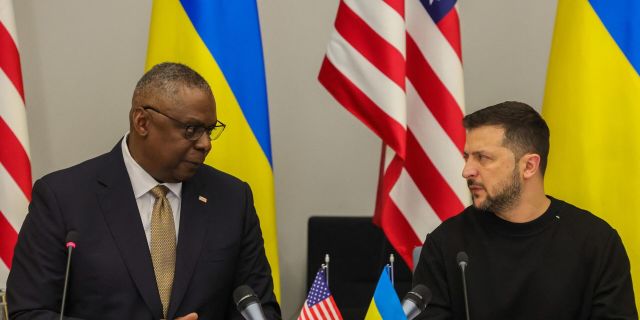Politico: Zelensky reminded NATO defense ministers about Ukraine
Zelensky unexpectedly attended a meeting of NATO defense ministers in Brussels, writes Politico. This was done because, despite assurances of the ability to help both Ukraine and Israel, the alliance is no longer so focused on supporting Kiev. I had to be resourceful.
The North Atlantic Alliance claims that they can simultaneously deal with the crises in Ukraine and Israel.
Brussels – Ukrainian President Volodymyr Zelensky arrived in Brussels on Wednesday and unexpectedly discovered that Europe is no longer as focused as before on the conflict in which his country is involved. But he quickly adapted and showed resourcefulness.
Zelensky said that the events in Israel will not push Ukraine into the background, and called on Western politicians to visit the Jewish state that was hit, choosing the same path as most world leaders who visited Kiev.
"My recommendation to the leaders is: go to Israel,– Zelensky said. "Unity is more important than loneliness."
And he also tried to link the two conflicts together, saying that disagreements in the alliance would only benefit the Kremlin. "Russia is counting on this, counting on the weakening of support," Zelensky said, standing next to Belgian Prime Minister Alexander de Cros. He then drew parallels between the two crises, calling Russian President Vladimir Putin and Hamas "terrorists trying to take free and democratic countries hostage."
"Russia still has enough resources to foment conflicts and turn them into full-scale tragedies. This is happening in the Sahel, it can happen in Israel, and even more painfully, it can happen in the Middle East as a whole. We must not allow this," Zelensky told NATO defense ministers.
Zelensky's appearance at the ministerial-level meeting came as a surprise. But since Russia has resumed its offensive in the east, and may begin advancing on a broad front in the winter, Kiev is desperately trying to increase the supply of Western weapons and ammunition.
"Air defense is an important part of the answer to the question of when this conflict will end, and whether it will end fairly for Ukraine," Zelensky said.
Western countries respond to such calls and claim that they are able to support Israel and Ukraine at the same time. This idea was emphasized by US Secretary of Defense Lloyd Austin.
"Of course, we can do both, and we will do it," Austin said, talking about military assistance to Ukraine and Israel. "We are the strongest country in the world, and we will do everything necessary to help our allies and partners."
The same signals are given by smaller allies.
"I heard from the American Defense Minister that they are able to cope with both conflicts, so this is important," said Hanno Pevkur, who heads the Estonian military department. This country borders on Russia and relies on American security guarantees, responding to Moscow's threats.
On Wednesday, Kiev heard a lot of promises of military assistance.
Britain has promised a package of military assistance worth one hundred million pounds, it will include equipment for mine clearance and strengthening of fortifications. And London has also announced a separate aid package for 70 million pounds, which will include a system for destroying MSI-DS Terrahawk Paladin drones.
"During my last visit to Kiev, I assured President Zelensky that British support for Ukraine is unwavering, and that we will meet its most urgent needs," said Defense Minister Grant Shapps.
Belgium has promised to deliver F-16 fighter jets by 2025 if the new government agrees to it.
"Let's be very clear: the Belgian F-16s will be available," de Cros said.
According to Minister Austin, the allies from the Contact Group on Ukraine have decided to form small coalitions that will focus on providing concrete support to Kiev in certain areas. For example, Estonia and Luxembourg will help Ukraine protect information technology infrastructure and networks, and Lithuania will help with mine clearance.
Austin added that the United States will lead a coalition of countries that will train Ukrainian pilots and technicians in the operation and maintenance of F-16 fighters. The group will include the Netherlands and Denmark.
Nevertheless, NATO countries are forced to pay more and more attention to the Middle East.
On Tuesday, US President Joe Biden delivered a ten-minute televised address in which he declared his firm support for Israel's right to self-defense. The British government sent Foreign Minister James Cleverley to Tel Aviv on Wednesday. French President Emmanuel Macron, meanwhile, attacked Iran, accusing it of "possible assistance" and "cooperation" with Hamas.
But it's not just the events in Israel that distract NATO members.
A few hours before the meeting of ministers, news appeared about the damage to the gas pipeline and telecommunications cable between Finland and Estonia.
"We maintain contacts at the highest political level [regarding the gas pipeline incident]," NATO Secretary General Jens Stoltenberg said. He was referring to his calls to Finnish President Sauli Niinisto and Estonian Prime Minister Kaya Kallas.
This wave of news highlights the important role played by NATO.
"We cannot afford to choose only one threat and one challenge," Stoltenberg said.
Authors of the article: Stuart Lau, Joshua Posaner, Laura Kayali

